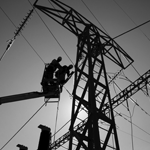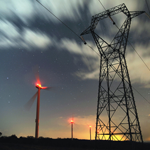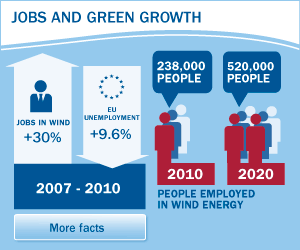 Last week the UK and France signed an agreement on nuclear power that could – going by the growing body of evidence on the rising cost of nuclear power – prove to be a huge drain on the public purse in the future. But at the same UK-France summit, a separate agreement was clinched to build an electricity interconnector between the two countries that could see Europe stepping closer to a more energy-secure future.
Last week the UK and France signed an agreement on nuclear power that could – going by the growing body of evidence on the rising cost of nuclear power – prove to be a huge drain on the public purse in the future. But at the same UK-France summit, a separate agreement was clinched to build an electricity interconnector between the two countries that could see Europe stepping closer to a more energy-secure future.
The interconnector cable, known as the FABLink, will connect France, the Channel Island of Alderney and mainland Britain. Edward Davey, UK Energy Secretary, said he recognises the “importance of further developing new electricity interconnectors between our two countries in order to strengthen further the linking of our grids, improve the security of our energy supplies and facilitate the integration of intermittent energy sources.”
 Many of us take electricity for granted. It’s there in the morning when we turn on the kettle and it’s there at night when we switch the lights on. But are people aware of the need to upgrade and extend Europe’s electricity grids? Does anyone know that there is no EU-wide market for electricity and of the benefits that such a market could bring?
Many of us take electricity for granted. It’s there in the morning when we turn on the kettle and it’s there at night when we switch the lights on. But are people aware of the need to upgrade and extend Europe’s electricity grids? Does anyone know that there is no EU-wide market for electricity and of the benefits that such a market could bring?
The results of a new study, which come as EU institutions debate the ‘infrastructure package’ – the European Commission’s draft proposals for updating and interconnecting EU electricity grids – show just what people in Brussels think of electricity grids and the market. Here’s what they had to say:
 Tempers seem to have frayed at yesterday’s EU Energy Council over the European Commission’s proposals for an EU-wide energy infrastructure package, the European Voice has reported. Günther Oettinger, European Commissioner for energy, was “visibly frustrated” at the meeting of ministers after many of them said they could not accept transferring authority for energy infrastructure from regions to EU level, the website said.
Tempers seem to have frayed at yesterday’s EU Energy Council over the European Commission’s proposals for an EU-wide energy infrastructure package, the European Voice has reported. Günther Oettinger, European Commissioner for energy, was “visibly frustrated” at the meeting of ministers after many of them said they could not accept transferring authority for energy infrastructure from regions to EU level, the website said.
The news comes as Energy Ministers across Europe were presented with a statement – supported by EWEA, Eurelectric, Europacable and 35 other organisations – calling for an internal EU market for energy and grid extensions and upgrades in order to boost security of supply, achieve our climate goals and bring more renewables online.
 With more than 450 people dying as of Tuesday because of the freezing temperatures currently sweeping Europe, news reports that Russia has reduced its natural gas supplies to some European countries once again highlights the problems of security of supply of imported fossil fuels.
With more than 450 people dying as of Tuesday because of the freezing temperatures currently sweeping Europe, news reports that Russia has reduced its natural gas supplies to some European countries once again highlights the problems of security of supply of imported fossil fuels.
European policy makers can’t do anything about the punishingly cold polar air that is expected to hover over the region for at least another week, but they can make sure that proposals currently before the European Parliament and Council of Ministers to speed up the permitting, and assist the financing, of grid extensions and upgrades are approved without being watered down. They can also put the right policy framework in place up to and beyond 2020 in order to boost the supply of domestically produced renewable energy.
 In Mozambique, nine people in ten have no access to electricity. Yet the village of Mipandi now has electric light for the first time thanks a wind-based micro-grid blue-print set up by EWEA’s chosen charity, Renewable World with local partners, The Clean Energy Initiative (TCEI).
In Mozambique, nine people in ten have no access to electricity. Yet the village of Mipandi now has electric light for the first time thanks a wind-based micro-grid blue-print set up by EWEA’s chosen charity, Renewable World with local partners, The Clean Energy Initiative (TCEI).
“In Mozambique, the expansion of clean and sustainable energy – such as micro wind power – offer clear advantages in addressing climate change and energy poverty”, says Jason Morenikeji from TCEI. He adds that Mozambique has 2,800km of coast-line, many inland lakes and highland which contribute to its localised wind patterns.
 Last week the UK and France signed an agreement on nuclear power that could – going by the growing body of evidence on the rising cost of nuclear power – prove to be a huge drain on the public purse in the future. But at the same UK-France summit, a separate agreement was clinched to build an electricity interconnector between the two countries that could see Europe stepping closer to a more energy-secure future.
Last week the UK and France signed an agreement on nuclear power that could – going by the growing body of evidence on the rising cost of nuclear power – prove to be a huge drain on the public purse in the future. But at the same UK-France summit, a separate agreement was clinched to build an electricity interconnector between the two countries that could see Europe stepping closer to a more energy-secure future.






 Comments
Comments



